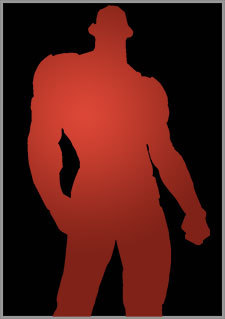Eowyn from Lord of the Rings reveals that she is a woman through the memorable quote, "I am no man;" when Ultron makes similar quips in The Avengers: Age of Ultron, including "You needed something more than a man," and, "There is no man in charge," many might assume that he is referring to how he is a machine with artificial intelligence. However, the religious allusions within the film subtextually imply that Ultron is instead designing himself as a divine being. Furthermore, the religious intertextuality within Ultron's dialogue in The Avengers: Age of Ultron encourages the audience to parallel Ultron with God, ultimately creating a villain with a predisposition for power.
When Ultron first glimpses the vibranium - a metal notorious in the Marvel universe for its durability - offered to him, he asserts, "Upon this rock, I will build my church." This cites Matthew 16:18, "And I tell you that you are Peter, and on this rock I will build my church." There is debate regarding what Jesus is referring to when he mentions the rock. However, passages of the Bible such as Deuteronomy 32:4, "He is the Rock, his works are perfect, and all his ways are just," imply that the rock could be God. Matthew 16:18 is difficult to apply to Ultron due to the ambiguity of the verse, but it is still crucial to recognize the source of the quotation.
Though the line may not refer to Matthew 16:18 despite the precise wording, it does pertain to Matthew 7:24-25, the story of a wise man who builds his house upon a rock. The verses explain, "Therefore everyone who hears these words of mine and puts them into practice is like a wise man who built his house on the rock. The rain came down, the streams rose, and the winds blew and beat against that house; yet it did not fall, because it had its foundation on the rock." The rock equates to the foundation of God's words, or - in other terms - his materials, for this is the base which faith is built upon. In Age of Ultron, the vibranium indicated in the line becomes the foundation of Ultron's plan and the material from which he constructs his improved form and the device used to attempt to cause human extinction. In this analogy, Ultron becomes God.
The second religious allusion occurs during a conversation between Ultron and Pietro Maximoff. Ultron begins, "The human race will have every opportunity to improve," to which Pietro responds, "And if they don't?" Ultron gives a striking two-word response - "Ask Noah." The mention of Noah, particularly in regard to mass extinction, relates to Genesis 6:7-8, "So the Lord said, 'I will wipe from the face of the earth the human race I have created - and with them the animals, the birds and the creatures that move along the ground - for I regret that I have made them.' But Noah found favor in the eyes of the Lord." God was the one who then prompted a flood that destroyed nearly all life upon earth, sparing only Noah because he deemed him worthy; similarly, Ultron intends to cause another extinction-level event, sparing only those who evolve to his standards.
The aforementioned quotation is not the closing reference Ultron makes to God's flood. Later in the film, he states, "When the earth starts to settle, God throws a stone at it, and, believe me, he's winding up." Of the religious remarks, this one is forthright in the way it is structured. Ultron mentions how God causes extinction-level events, such as the previous reference to the flood, and comments on how God must be preparing to do it again. However, there is no evidence within the source material that alludes to God being the one to influence the impending collision between a risen Sokovia and the rest of the earth that would result in mass annihilation; Ultron is the one formulating the doom of humanity. The way the statement is phrased implies that God is preparing for such an event, but, because Ultron is actually the one attempting to annihilate the human race, he once again equates to God.
The final reference is embedded in a scene where Tony Stark, adorned in his Iron Man suit, approaches Ultron during the concluding battle. Ultron greets Tony with the line, "Come to confess your sins?" There are an abundance of verses pertaining to the forgiveness of sin, and Mark 2:7 says, "Who can forgive sins but God alone?" This reveals that only God has the ability to forgive sins. However, in Age of Ultron, Ultron asks Tony if he had come to admit his wrongs, to which Tony responds with a sarcastic, "I don't know; how much time do you got?" Theoretically, if Tony had admitted his wrongs and evolved to the extent where he satisfied Ultron's standards as discussed previously, then Ultron would have been the one to pardon him - or, in this particular situation, forgive his sins as God has the ability to forgive those of his believers.
Ultron's dialogue frequently dwells upon religion, especially aspects of God that pertain to his characterization. There is one particular statement Ultron makes that has not been yet mentioned, and it is as follows, "Did you know this church is in the exact center of the city? The elders decreed it so that everyone could be equally close to God. I like that. The geometry of belief." The construction of Ultron as God is furthered through this quote, for he is physically residing in God's location at the center of the city while making the comment, but it also serves a purpose similar to metafiction - it reflects upon the religious geometry within the film, particularly through the way that Ultron, a machine determined to exterminate the human race, parallels God, a divine entity associated with love and compassion.
All Biblical translations are taken from the New International Version (NIV).

